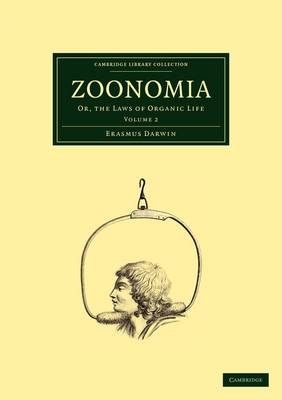
Zoonomia: Volume 2
Or, the Laws of Organic Life
Seiten
2010
Cambridge University Press (Verlag)
978-1-108-00550-0 (ISBN)
Cambridge University Press (Verlag)
978-1-108-00550-0 (ISBN)
The two-volume Zoonomia (1794–6) attempts to 'reduce the facts belonging to animal life into classes, orders, genera, and species; and by comparing them with each other, to unravel the theory of diseases' and marks a new stage in the development of the science of medicine.
Erasmus Darwin (1731–1802) is remembered not only as the grandfather of Charles but as a pioneering scientist in his own right. A friend and correspondent of Josiah Wedgwood, Joseph Priestley and Matthew Boulton, he practised medicine in Lichfield, but also wrote prolifically on scientific subjects. He organised the translation of Linnaeus from Latin into English prose, coining many plant names in the process, and also wrote a version in verse, The Loves of Plants. The aim of his Zoonomia, published in two volumes (1794–6), is to 'reduce the facts belonging to animal life into classes, orders, genera, and species; and by comparing them with each other, to unravel the theory of diseases'. The first volume describes human physiology, especially importance of motion, both voluntary and involuntary; the second is a detailed description of the symptoms of, and the cures for, diseases, categorised according to his physiological classes.
Erasmus Darwin (1731–1802) is remembered not only as the grandfather of Charles but as a pioneering scientist in his own right. A friend and correspondent of Josiah Wedgwood, Joseph Priestley and Matthew Boulton, he practised medicine in Lichfield, but also wrote prolifically on scientific subjects. He organised the translation of Linnaeus from Latin into English prose, coining many plant names in the process, and also wrote a version in verse, The Loves of Plants. The aim of his Zoonomia, published in two volumes (1794–6), is to 'reduce the facts belonging to animal life into classes, orders, genera, and species; and by comparing them with each other, to unravel the theory of diseases'. The first volume describes human physiology, especially importance of motion, both voluntary and involuntary; the second is a detailed description of the symptoms of, and the cures for, diseases, categorised according to his physiological classes.
Preface; 1. Diseases of irritation; 2. Diseases of sensation; 3. Diseases of volition; 4. Diseases of association.
| Erscheint lt. Verlag | 28.1.2010 |
|---|---|
| Reihe/Serie | Cambridge Library Collection - History of Medicine |
| Verlagsort | Cambridge |
| Sprache | englisch |
| Maße | 40 x 297 mm |
| Gewicht | 1890 g |
| Themenwelt | Naturwissenschaften ► Biologie ► Evolution |
| ISBN-10 | 1-108-00550-0 / 1108005500 |
| ISBN-13 | 978-1-108-00550-0 / 9781108005500 |
| Zustand | Neuware |
| Haben Sie eine Frage zum Produkt? |
Mehr entdecken
aus dem Bereich
aus dem Bereich
Wie die Vernichtung der Arten unser Überleben bedroht - Der …
Buch | Softcover (2023)
Penguin (Verlag)
15,00 €


